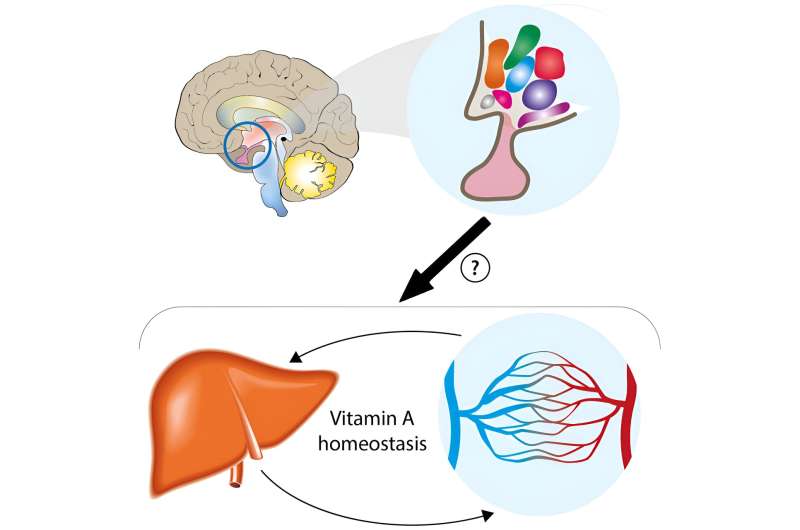
In a new study, scientists from the University of Aberdeen looked at vitamin A and how the brain reacts to it. Vitamin A is essential for life but until now it was not known how it is maintained in the body.
Previously thought to be the duty of other organs in the body including the liver and kidneys, this is the first-time that scientists have identified a role for the brain in vitamin regulation and could have implications for diagnosis and treatment of vitamin-related diseases from anemia to infertility to blindness.
The study was conducted initially on rats and found that a region of the brain called the hypothalamus may be responsible for controlling the levels of vitamin A, and that there may be top-down control of vitamin A function around the body.
Conducted by Professor Peter McCaffery and Dr. Peter Ikhianosimhe Imoesi and published in iScience, this study reveals for the first time that the hypothalamus, which regulates many body systems including temperature, appetite and thirst has been implicated in the control of vitamins in the body.
Like all vitamins, vitamin A, also known as retinol, is essential for life—it is important for vision, the immune system, reproduction, growth and development of the fetus, as well as function of many organs, including the heart, lungs and brain. Recently, vitamin A has been considered important for the survival of cells in the brain and it may even be protective for neurodegenerative disorders such as motor neuron disease.
The body cannot make vitamin A by itself and it must be obtained from the diet in the form of leafy green vegetables, orange and yellow vegetables or beef liver, milk or eggs. It is already known that vitamin A is stored in the liver but until now there was little understanding as to how levels were maintained in the body. This is a delicate balancing act, vitamin A deficiency can lead to disastrous weakening of the immune system as well as visual and skin problems and while excess vitamin A is less common it can lead to problems again with vision, the skin, as well as swelling of the brain.
The study showed that application of very small amounts of vitamin A directly to the hypothalamus of the rat brain impacted the amount of vitamin A in the storage area of the liver and the amount of the vitamin distributed to cells of the body via the blood. This, the authors suggest, implies that a vitamin A sensor system is present in the hypothalamus that controls how it is distributed in the body.
The study also showed that the type of cells in the rat hypothalamus that may act to sense vitamin A are also present in the human hypothalamus.
Dr. Imoesi explains, “What we found is radically new. No one before has even suggested that the brain may control vitamin balance in the body and this is the first study to imply a ‘vitaminostatic’ role of the hypothalamus.
“Our results suggest that vitamin A imbalance may not be simply due to irregular intake but that an abnormality in hypothalamic function due to disease or inflammation, may lead to inadequate supply of vitamin A to the body. Diseases that effect the hypothalamus may have some of their symptoms due to disordered vitamin A levels in the body. Measurement of vitamin A levels in the blood may provide a guide to whether the hypothalamus is functioning normally.
“Understanding the regulation of vitamin A balance in the body is important given that both deficiency and excess are detrimental to human health. Worldwide an estimated 250 million people are marginally deficient of vitamin A while 140 million pre-school children and around 7.2 million pregnant women are believed to be vitamin A deficient. Normal hypothalamic function may be necessary to balance vitamin A and act to reduce such harmful effects. ”
More information:
Peter I. Imoesi et al, Control by the brain of vitamin A homeostasis, iScience (2023). DOI: 10.1016/j.isci.2023.107373
Journal information:
iScience
Source: Read Full Article
